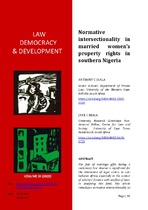| dc.contributor.author | Diala, Anthony C | |
| dc.date.accessioned | 2021-05-28T11:17:10Z | |
| dc.date.available | 2021-05-28T11:17:10Z | |
| dc.date.issued | 2020 | |
| dc.identifier.citation | Diala, A,C. and Diala, J.C. Normative intersectionality in married women’s property rights in Southern Nigeria.24 Law, Democracy and Development pp. 86-108 | en_US |
| dc.identifier.issn | ISSN: 2077-4907 CC-BY 4.0 | |
| dc.identifier.uri | http://dx.doi.org/10.17159/2077-4907/2020/ldd.v24.4 | |
| dc.identifier.uri | http://hdl.handle.net/10566/6216 | |
| dc.description.abstract | The fate of marriage gifts during a customary law divorce is significant for the interaction of legal orders in sub-Saharan Africa, especially in the context of scholars’ fixation with conflict of laws. In analysing this fate, this article introduces normative intersectionality as a theoretical framework for a nuanced understanding of how laws and socio-economic forces interact in post-colonial settings. Normative intersectionality rejects a legal positivist view of rights, which neglects people’s adaptation of indigenous norms to socio-economic changes. In this sense, normative intersectionality is useful for addressing the traditional Igbo law of matrimonial property, which regards a married woman’s property rights as subsumed in her husband’s rights.
Using the division of marriage gifts in Southern Nigeria as a case study, the article draws attention to how legal orders speak to, rather than against, each other, and in so doing, stresses the adaptive character of indigenous laws. It argues that normative intersectionality illumines the interplay of gender equality, property rights and legal pluralism. Accordingly, it urges judges to use the imitative nature of legal pluralism in post-colonial settings to remedy entrenched systems of injustice and inequality, which often hide under the banner of tradition. | en_US |
| dc.language.iso | en | en_US |
| dc.subject | Matrimonial property rights | en_US |
| dc.subject | African customary law | en_US |
| dc.subject | Marriage gifts | en_US |
| dc.subject | Adaptive legal pluralism | en_US |
| dc.title | Normative intersectionality in married women’s property rights in Southern Nigeria | en_US |
| dc.type | Article | en_US |

